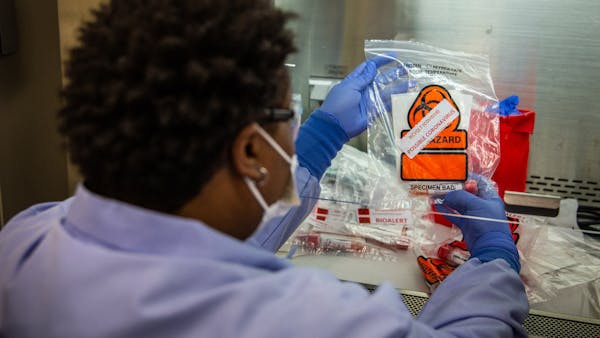The federal court system in Minnesota on Friday temporarily suspended all civil and criminal jury trials effective immediately, while the state court system chose to remain open, continuing with "high priority" cases and suspending others.
The unprecedented moves came on the same day Gov. Tim Walz declared a peacetime state of emergency for Minnesota as coronavirus spreads across the globe.
Shortly after Walz's announcement, Minnesota Supreme Court Chief Justice Lorie Gildea issued an order governing changes to the state courts starting Monday.
"The Minnesota Judicial Council is committed to responsibly managing our statewide court system while taking every reasonable step to protect the health and well-being of our judicial officers, staff, and court users," she said.
Among the moves laid out for state courts:
• Court facilities will remain open and will accept filings for "all case types," although the public will be discouraged from visiting for nonessential matters.
• Criminal and civil jury trials that are underway will continue until their resolution.
• "High priority" and "super high priority" cases will continue as normal, though the courts are encouraged to use remote technology to conduct hearings.
• "Medium priority" and "low priority" cases will be postponed for two weeks, and jury trials will not be scheduled for the next 30 days.
Gildea wrote that state court employees will be allowed to work remotely with approval, but that is dependent on adequate staffing at court facilities and "can be terminated at any time." She encouraged social distancing at facilities. And employees who are at high risk for illness should speak to their supervisors, she added, thanking them for their "incredible work during this challenging and worrying time."
Earlier Friday, Chief U.S. District Judge John Tunheim issued a general order that suspends all federal trials and grand juries, a key tool prosecutors use to level charges, starting March 23 through April 27. The order applies to all four federal courthouses in Minnesota, and calls for employees to work remotely when possible and for social distancing. All other court services will remain open and naturalization ceremonies will continue.
At Walz's news conference, he and Minnesota Attorney General Keith Ellison said that they were confident the state judicial branch had a sound plan. Ellison said that cases for defendants in custody should go to court first but that others, including civil cases, could be delayed.
"I'm confident that the chief justice and the judiciary are ready to make sure that the continuity of government goes forward," Ellison said. "The rule of law is part of the continuity of government, and the rule of law is critical in these times."
Meanwhile, Twin Cities public defenders and criminal justice advocates are pushing for the early release of elderly and other high-risk inmates — particularly those who have not been convicted of crime.
The American Civil Liberties Union of Minnesota planned to write the governor, courts and corrections officials urging them to consider releasing older people and those with underlying health conditions. Incarcerated populations suffer from disproportionately high rates of chronic illness.
"This could be devastating," said Teresa Nelson, legal director for the ACLU of Minnesota. "We have people who are sitting in jail who can't afford $100 bail. We're just increasing their risk if we keep them there."
Rob Allen, chief of staff for the Hennepin County sheriff, said the office can only release inmates with pending cases with the court's approval. "We will react to what the court decides," he said.
Hennepin County Public Defender Bob Kolstad, a union steward speaking for himself and not the defender's office, said the Sheriff's Office should "minimize the number of people in jail as much as they can" to limit the risk of spreading the virus among inmates, staff and visitors.
Outbreaks are common in jails and prisons, where inmates share small cells, use toilets beside their beds and spend hours in close contact with one another.
The Sheriff's Office has restricted programming at the jail, and on Friday announced that public visitation would be cut from three days a week to two — Monday and Saturday. Sunday visitation was eliminated, and visitors who display signs of illness will not be admitted. Allen said the situation is fluid and advised visitors to check the sheriff's website for updates.
In St. Paul, Ramsey County Sheriff Bob Fletcher ordered daily temperature checks on several hundred inmates and instructed jail staff to screen visiting clergy members. In-person visits were called off Tuesday and are now conducted via monitors. Lawyers are also barred from face-to-face meetings with clients.
Ramsey County Chief Public Defender Jim Fleming advocated canceling jury calendars until further notice and releasing inmates at high risk from an infection.
"They have to do this. It transcends the criminal justice system," Fleming said, emphasizing that there's no vaccine or "magic pill" that will stop the virus' spread.
Department of Corrections Commissioner Paul Schnell is also exploring contingency plans to make room inside the state's 11 prisons should the state reach a full-scale infection. In that scenario, the agency would consider placing pregnant women and nonviolent individuals who are 60 to 90 days away from their discharge date on supervised release. That would make space available to quarantine anyone who gets sick, he said.
"We're not going to release people who pose a big threat," Schnell said.
Kyle Christopherson, a spokesman for the State Court Administrator's Office, said the state court system hasn't had a systemwide or partial shutdown in his 15 years with the office.
chao.xiong@startribune.com
612-270-4708
liz.sawyer@startribune.com 612-673-4648
andy.mannix@startibune.com 651-247-4462

Want to share info with the Star Tribune? How to do it securely

'Safe recovery sites' would offer syringes, naloxone and more to people using drugs. The plan could be in peril.
New Minnesota GOP leaders seek peace with party's anti-establishment wing

Who is Republican Lisa Demuth, Minnesota's first House speaker of color?

